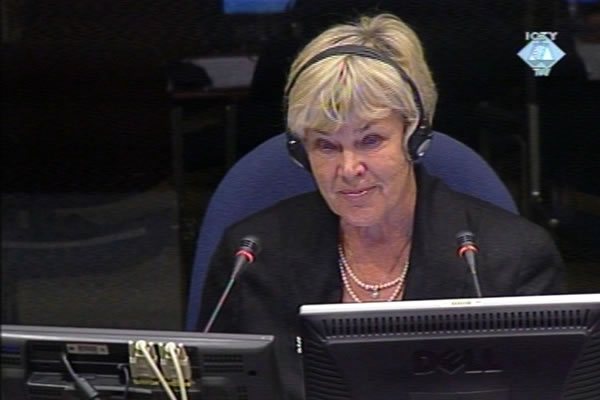Home
SUSAK WAS NOT HAPPY, TUDJMAN WAS NOT INTERESTED
Describing her meetings with Croatian officials in 1995, former UN special rapporteur for human rights Elisabeth Rehn noted that Croatian defense minister ’didn’t like her or her reports’ while president Franjo Tudjman showed no interest in the return of refugees and prosecution of those who committed crimes
 Elisabeth Rehn, witness at the Gotovina, Cermak and Markac trial
Elisabeth Rehn, witness at the Gotovina, Cermak and Markac trial In August 1995, when Operation Storm took place, Finnish politician Elisabeth Rehn was the UN special rapporteur for the human rights. In the reports she drafted in the months following Operation Storm, she noted several things that are consistent with the prosecution case at the trial of Croatian generals Ante Gotovina, Ivan Cermak and Mladen Markac. She noted that civilian targets were shelled in Knin during the attack of the Croatian army and the police and that after the operation ended, the remaining Serbs were killed and abandoned houses were set on fire and looted.
In a letter sent to the Croatian foreign minister Mate Granic in February 1996, she asked for the results of the investigation into the murder of five Serb civilians in the village of Grubori on 25 August 1995. The Croatian authorities provided replies to various questions but the only thing they said about the Grubori incident was that the investigation was in progress. In her opinion, the UN staff in the field could assist in the investigation since they were in the village on the day the murders were committed. Among other things they noted the license plates of the cars they saw there, but nobody ever asked them to assist.
In the statement she gave the OTP investigators in 2005, the witness described the meetings she had with Croatian officials on 4 December 1995. In her words, the defense minister Gojko Susak ’didn’t like either her or her reports’. He thought that she focused too much on crimes committed by the army troops. The same day she met with president Tudjman and they discussed the violations of human rights after Operation Storm. He was not interested in the return of refugees and investigation of crimes against Serbs, she claims; this led her to conclude that there was no political will to punish those who committed crimes.
In the cross-examination, Ante Gotovina’s defense counsel showed Rehn several reports drafted in August 1995 by the UN military and civilian observers. Their findings on the shelling of Knin differ from what the witness concluded. The reports speak of artillery fire targeting military installations, with only about twenty Knin houses being hit. As she clarified, Rehn drafted her reports not only on the basis of the information received from the UN military observers but also on her conversations with the local population and politicians.
In an effort to prove that the perpetrators of the crimes were prosecuted, Gotovina’s defense counsel Luka Misetic showed the ‘farewell report’ filed by the special rapporteur for human rights in January 1998. In it, Rehn says that the Croatian authorities have told her that approximately 5,500 criminal reports were filed against those who committed murders, looting and destruction of houses; about 1,200 cases were brought to completion. However, in her statement to the OTP investigators, Rehn said that on the basis of those figures she couldn’t tell the nature of the crimes and the ethnic background of the perpetrators and victims. Today she admitted that she and her associates weren’t persistent enough in their demands to be given those data.
Elisabeth Rehn’s evidence will continue tomorrow with the cross-examination by the defense counsel for Ivan Cermak and Mladen Markac.
Linked Reports
- Case : Gotovina et al. - "Operation Storm"
- 2008-07-14 WITNESS: RANDOM SHELLING OF KNIN
- 2008-07-11 UNWILLING PROSECUTION WITNESS DEFENDS MARKAC
- 2008-07-10 HOUSES WERE BURNING BUT NOT SET ON FIRE
- 2008-07-16 NOT A WORD ABOUT GRUBORI
- 2008-07-18 DIFFERENT VIEWS OF CROATIA AND OTP
- 2008-07-21 WITNESS: ‘GOTOVINA WAS IRRITATED BY MY BEHAVIOR’
